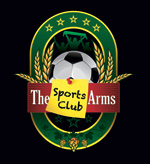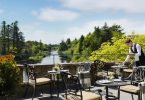Drinking for sport
Your local sports club – once a hall with a trestle table – has moved on. Many have grown to become sopthisticated social venues where drink is available – and not always just for members in some cases.
“For a while we kept them at bay as we’d nicer places but today’s clubs have nice premises,” explained one publican, claiming, “They do weddings and functions. There’s a pitch & putt club near me that had a big sign on its gate offering to hold Christmas parties”.
Others perceive clubs close to them being run purely for profit, eschewing traditional club ethos.
As the Government officially frowns on alcohol associations with sport one might wonder whether sports clubs should be registered for alcohol at all, especially as they’re mostly about young people and sport.
But such ‘Registered Clubs’ can sell alcohol under the Registration of Clubs Acts 1904 to 2000 entitling members (and signed-in) visitors to be supplied with intoxicating liquor for consumption on the club premises.
Ironically, considering their ‘registered’ category, the number of Registered Clubs around the country remains difficult to establish. Individual District Courts keep a register of such applications from clubs and those granted a certificate, but no national tally or register exists.
In the Dublin area, a visit to Áras Uí Dhálaigh indicates that 258 such registrations were granted from a total of 305 on the record books in 2011.
A Registered Club must renew its certificate of registration annually. But there the similarity with a Seven-Day Publican’s Licence ends.
For a club enjoys considerable advantages by way of reduced costs over the pub in areas such as rates, taxes, BskyB and labour costs. And for some clubs, not having the same costs as public houses nearby has led to the demise of those pubs.
Club advantage
“They’ve huge advantages to us in a lot of ways,” believes one affected publican, pointing out that clubs used get State aid, something that bothers him on another level.
“Should the State be aiding some place that’s selling drink?” he ponders, “Would they give State aid to a sports club belonging to a cigarette factory? I don’t think so.”
Neither is it unusual to hear of clubs funded by the National Lottery, something of which the publican cannot avail.
By contrast, pubs can’t even tap the tourist board for funding yet remain the country’s top tourist attraction.
Registered Clubs need only pay rates on the bar area itself and are unlikely to pay Corporation Tax on any profits made if they apply to the Revenue for a ‘Sporting Exemption’.
In being able to avail of ‘casual’ labour most can offer reduced prices for drink. And some pubs in a club’s locality have tried to follow suit in what many publicans describe as “a race to the bottom” to entice back their lost customers.
Publicans from Monaghan to Mitchelstown claim to have suffered from this unfair competition from clubs. In Dublin alone pubs in Ringsend, Coolock, Raheny, Phibsborough and Crumlin claim to have been affected. But pubs in other suburbs such as Ballyboden, Clontarf and Stillorgan have also been affected.
For example one publican claims to have seen his customers being poached on big match days by the local club with ‘recruiters’ visiting his premises and telling his customers that they should come up to the clubhouse and watch it on the bigger screen.
Clubs flouting registration conditions?
Under the rules of registration for a club, only club members may buy a drink. ‘Guests’ are meant to be signed-in and only able to purchase drink through the member accompanying them, but a number of publicans have claimd that in some cases it’s a ‘free-for-all’.
However one of the biggest issues for pubs near to some clubs seems to be the hosting of parties, funerals and weddings in clubs which are not only run as an enterprise but are also advertised as such in a lot of cases.
Clubs are not supposed to advertise events outside the club itself but many now openly vie for wedding and party business of all types.
Publicans have also accused some clubs of being “open all hours” and of serving drink late into the night to a time beyond which a mortal pub could do this.
But every one of these publicans feels reluctant to be identified speaking out against such clubs for fear of losing more customers or drawing down the wrath of the local Super. That’s why not one publican would go ‘on the record’ for this article.
Pubs shutting down
A number of publicans have further claimed that the encroachment by many of these clubs has been responsible for pubs calling ‘time’ in various parts of the country. There are half-a-dozen rugby clubs within a small radius of one South Dublin pub – competition that’s hard to counter when one considers the advantages enjoyed by clubs over pubs.
In the meantime, publicans remain sceptical of the sporting priorities of those drinking in such ‘clubs’.
As one put it, “There are fellows drinking in sporting clubs around the country that wouldn’t know a Gaelic ball, a golf ball or a rugby ball if it knocked them off the bar”.
 Publicans from Monaghan to Mitchelstown claim to have suffered from this unfair competition from clubs.
Publicans from Monaghan to Mitchelstown claim to have suffered from this unfair competition from clubs.








